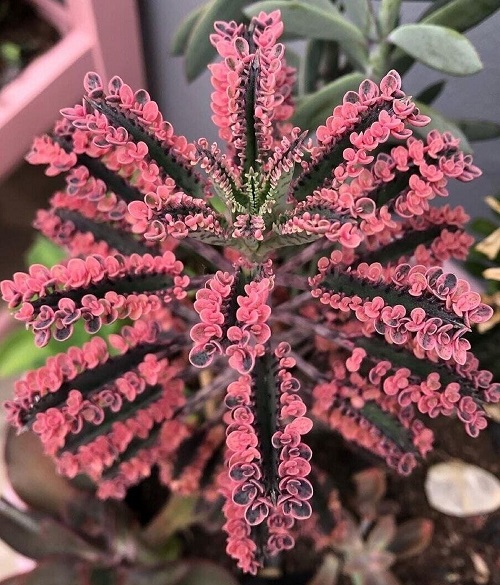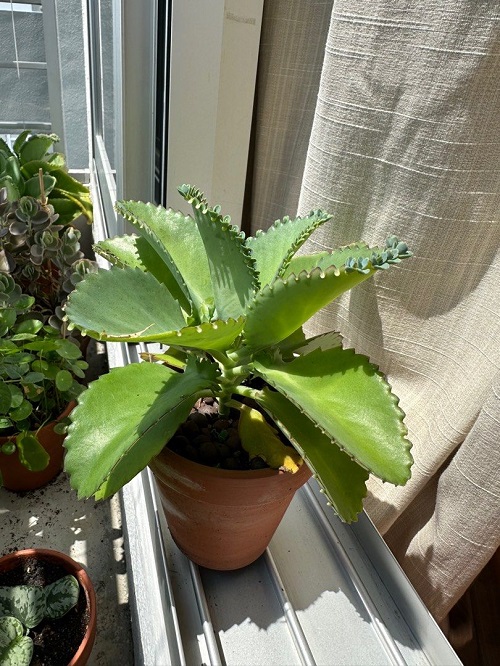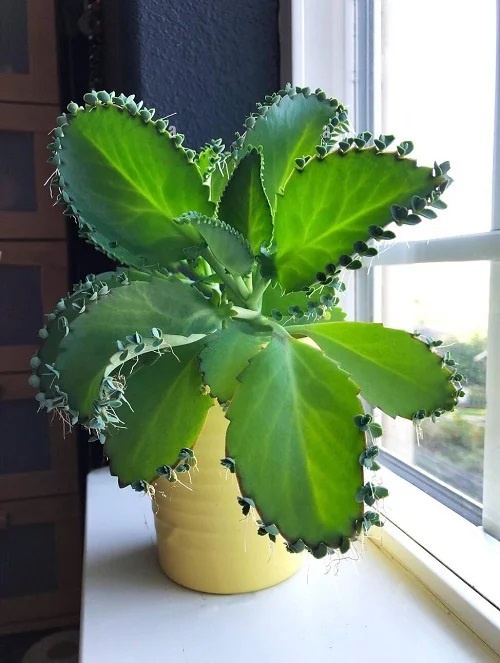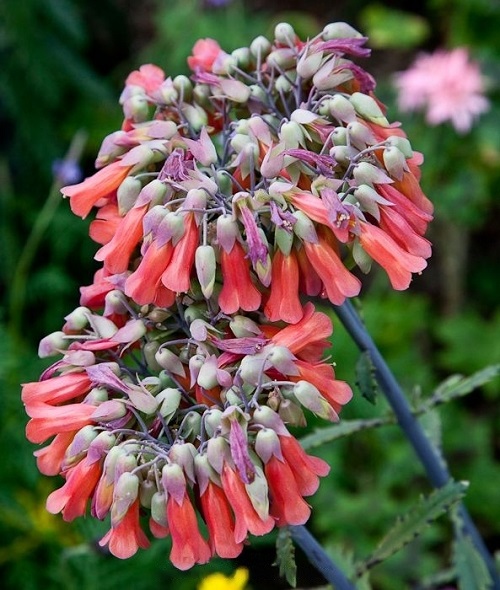Want to know what the Mother of Thousands Plant and Flower Meaning is? We have all the information you need!

Sometimes, succulents go beyond just being plants! One of them is a small little specimen that also carries a rich history. Here’s everything about Mother of Thousands Plant and Flower Meaning.
Mother of Thousands Plants
Kalanchoe daigremontiana, Kalanchoe delagoensis, Kalanchoe laetivirens, and Bryophyllum pinnatum are referred as Mother of Thousands plants in the botanical world.
Kalanchoe daigremontiana
- Propagation Method: Produces plantlets along the leaf edges
- Where Found: Usually on the mother plant’s leaf margins
Bryophyllum pinnatum
- Propagation Method: Small plantlets grow on the scalloped edges of their leaves
- Where Found: On the leaf edges and sometimes at leaf nodes
Kalanchoe delagoensis
- Propagation Method: Plantlets grow at the tips of their tubular leaves
- Where Found: Mostly at the tips of the leaves
Kalanchoe laetivirens
- Propagation Method: Generates plantlets on broad, flat leaves
- Where Found: Along the surface or edges of leaves
Chrysanthemum Flower Meaning and Symbolism
Mother of Thousands Plant Meaning

The name “Mother of Thousands” comes from the plant’s ability to produce many small plants on the edges of its leaves.
This phenomenon is important in various cultures, where it symbolizes abundance and fertility, which means the ability of a plant to produce countless offspring. The analogy between the plant’s fertile reproduction and that of a mother of many children emphasizes its remarkable reproductive powers.
In addition, the name “mother of thousands” has a deeper meaning, representing the nourishing and caring nature of the plant. Like a devoted mother caring for her children, this plant continuously produces independent seedlings that grow with little care and intervention.
The name’s dual meaning emphasizes the plant’s ability to reproduce and resilience, making it an exciting addition to gardening and symbolism.
Mother of Thousands Plant Symbolism

1. Abundance and Prosperity
This plant is a symbol of the protection and prosperity in Madagascar. Growing this plant near the home wards off negative energy and invites good luck.
The plant’s remarkable ability to produce many offspring associates it with abundance, signifying the plentiful nature of life.
2. Life and Death
In Mexico, this plant has connections to the Day of the Dead (Dia de los Muertos) festivities. Some believe that the fertile offspring of the mother of thousands symbolizes the cycle of life and death, making it a significant part of their Day of the Dead celebration.
3. Feng Shui
In China, people cultivate the Mother of Thousands as a Feng Shui plant, believing it brings positive energy and good luck to the home. The plant’s ability to multiply is a symbol of growth and prosperity in Feng Shui practices.
Purple Heart Plant Meaning and Symbolism
4. Protective Qualities
In various cultures, it is believed to have protective properties, warding off negative forces and bringing blessings to those who care for it.
5. Fertility and Growth
Due to its prolific propagation through tiny leaf plantlets, it symbolizes fertility, continuous growth, and abundance.
The Significance of Flowers

The flowers of the Mother of Thousands are small and bell-shaped. They typically grow in clusters at the top of tall, slender stalks that rise above the plant’s succulent leaves.
- Appearance: The flowers comprise four or five petals that form a tubular shape with a slight flare at the end. They have a delicate and dainty appearance.
- Colors: Mother of Thousands of Flowers come in various colors, including shades of pink, orange, red, and yellow. The petals may have contrasting specks or streaks, adding to their visual appeal.
Cultural Meanings and Symbolism
- The bell-like flowers of the Mother of Thousands symbolize delicacy and beauty, enhancing the plant’s overall ornamental appeal.
- In traditional Chinese culture, red is associated with luck and happiness. Red flowers, including those of the Mother of Thousands, symbolize good fortune. This aligns with the plant’s use in Feng Shui to bring positive energy and prosperity.
- Mexican folklore incorporates the bright colors of these flowers in festive decorations to honor deceased loved ones.
Formal rituals or ceremonies are not typically associated with this plant; its colorful flowers serve various purposes. People commonly use them for home decoration, give them as symbols of well-wishing, and celebrate them as signs of successful cultivation among gardening enthusiasts.


